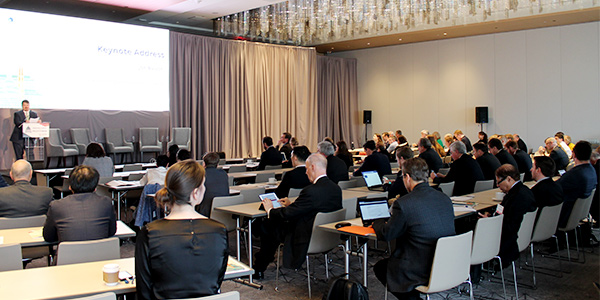By Michael Brooks
WASHINGTON — The Green New Deal — the nonbinding resolution introduced early last month by Rep. Alexandria Ocasio-Cortez (D-N.Y.) and Sen. Ed Markey (D-Mass.) calling for the U.S. to use 100% renewable energy resources by 2030 — has sparked furious debates among policymakers, experts and the national media.
There is plenty to disagree about: the resolution’s merits; its feasibility; its inclusion of other goals unrelated to climate or energy, such as those regarding health care; and whether it will help, or hurt, Democrats in the 2020 elections.
But in at least one of these debates, which took place during the American Council on Renewable Energy’s Renewable Energy Policy Forum last week, everyone agreed on something: The Green New Deal has put climate change to the fore of U.S. politics like never before.
“We’ve had more conversations about climate in the last five weeks since we introduced the Green New Deal than we’ve seen in the past 10 years,” said Morgan Gray, Markey’s legislative director.
Though the conference, which attracted about 100 renewable industry executives to the Conrad Hotel on Wednesday, featured panels on topics such as state renewable portfolio standards and integrating renewables into RTO/ISO markets, federal policy on climate change was top-of-mind for many who spoke or asked questions.
‘Good Politics’
Washington Gov. Jay Inslee, one of the 14 (as of press time) major candidates to be the Democratic nominee for president, set the tone for the day with his opening keynote speech.
“I believe very strongly that defeating climate change, building clean energy [and] building renewable energy must be the number one job of the United States, because if it is not Job 1, it won’t get done,” said Inslee, who has made climate policy the centerpiece of his political career and campaign.
Though he stopped just short of endorsing it, Inslee said the Green New Deal has been helpful in moving climate change up the list of priorities for Congress. He noted, as many other speakers did, that climate was not even discussed during the 2016 presidential debates.
Absent from the resolution is a plan detailing how the U.S. would achieve the ambitious goals. This was a source of contention among Gray and his fellow panelists, who often freely sparred without interference from moderator Julia Pyper, senior editor at Greentech Media.
The Green New Deal “is good politics,” said Alex Flint, executive director of the Alliance for Market Solutions, a conservative think tank that advocates a tax on carbon emissions. “Climate change is an increasingly important thing to voters in both parties, and we’re beginning to see that. That’s why the Green New Deal has resonated.
“From a policy perspective, it’s completely bankrupt,” he continued. “There’s no actual policy: What’s going to happen with FERC, the Federal Power Act? Are we going to need a new tax policy? None of that is there.”
But, “and this is a good thing, it’s pulled Democrats so far to the left that it has a created an opening at the center of political discourse for Republicans.”
Christy Goldfuss, senior vice president of energy and environment policy for the Center for American Progress, debated with Flint about a carbon tax being the “only” solution, saying, “We are going to have to take many big steps in order to address climate change.”
But she agreed that the Green New Deal “brings people to the table to figure out solutions that have bipartisan support.” She noted that Democrats were able to take control of the House of Representatives by moderate candidates winning in purple districts. They will be looking for legislation they can compromise with Republicans on, she said. “Absent the Green New Deal, that would not be where we are.”
A Real Deal?
The resolution is too politically charged, with Republicans ridiculing it as a ban on airplanes and hamburgers, said Heather Reams, executive director of Citizens for Responsible Energy Solutions, another organization that advocates market-based solutions to climate change. But she also said she was pleased that it has sparked real debate over solutions to climate change.
“Republicans need to step up,” Reams said. “They need to start talking about what they’re for, instead of what they’re against. And they need to do that, like, ASAP.” The comment prompted murmurs of agreement from the audience.
“That’s a wholly new statement that I haven’t heard in the last 10 years,” Gray said. “I think that’s kind of the shift that we’ve seen as a result of the Green New Deal.”
All of the Democratic presidential candidates who serve in the Senate are cosponsors of Markey’s resolution and swiftly endorsed it as part of their campaigns, while more moderate and pragmatic members of the party have dismissed it as too ambitious. (See House Democrats Put Climate Change Front and Center.)
Seeking to capitalize on the division, Senate Majority Leader Mitch McConnell (R-Ky.) has planned a vote on the resolution for this week. Minority Leader Chuck Schumer (D-N.Y.) is urging his caucus to simply vote “present.”
On Friday, Politico reported that it had obtained a draft of a “Green Real Deal” being circulated by Rep. Matt Gaetz (R-Fla.) to counter the Green New Deal. The draft acknowledges climate change as a threat to national security and says the government should promote innovation to reduce greenhouse gas emissions, but it does not set any targets for future carbon cuts.







